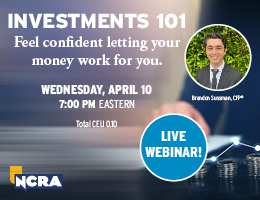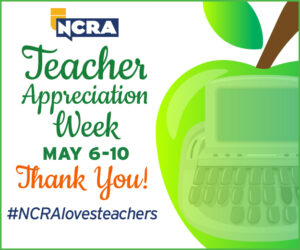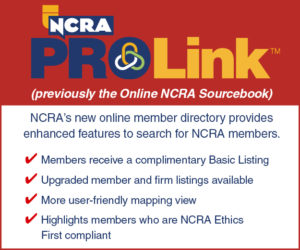By David Ward
Much like an umpire in baseball or softball, today’s court reporters are expected to do their job so well that they end up being a very quiet enhancer of the legal process, save for the barely audible clicks as they use their keyboards. But that role, an essential as it is, can make it a challenge for reporters to create a memorable impression on the attorneys they work alongside. Yet impressing attorneys is an important part of the new business development for both independent contractors and firm owners – and to be good at it, reporters need to be seen as more than simply a professional with some cool technology at their fingertips.
“Personality always plays a big part as far as I’m concerned,” explains Frank Dunn, CLVS, owner of Boston-based Dunn Reporting Services. “You need to be able to relate to the attorney and have a good working relationship. But there’s a point when it’s time to be quiet and a point when it’s time to make conversation, and reporters really need to know when those points are.”
Tere Moore, RPR, CRR, CRI, owner of Cincinnati’s Top Quality Reporting Services, says: “The most successful reporters I have seen display charisma and have a happy and bright demeanor. They remember personal things about their attorneys and are able to chit-chat about sports or issues of the day. Most of all, showing attorneys little tips and tricks on their computers goes a long way.”
Small talk can break the ice and create a good impression in plenty of business situations, but Denver-based Lisa Knight, RMR, CRR, owner of Knight International Court Reporting, stresses it always should done judiciously.
“My experience is that attorneys are people and they’re human and there’s one thing that they’re focusing on when they’re doing a deposition and one thing only: and that’s surviving that deposition,” says Knight, whose husband is a lawyer. “I always try to feel out the room and develop a rapport with the attorney. But I also know that if he’s got two boxes of exhibits dumped into the room, he has his computer open, and he’s working, it’s not my time to talk.”
A friendly, outgoing business manner and knowing when it’s appropriate to engage attorneys will help impress attorneys, but if, and only if, that’s backed up with great reporting.
Dayton, Ohio-based Sue Terry, FAPR, RPR, CRR, says: “One thing that works in impressing attorneys is being consistently timely, professional, and especially knowledgeable about reporting, the transcript, the record,” she says. “When you help attorneys out with the little things, they remember that.”
Terry, who is NCRA’s Vice President, offers seminars where she provides advice and guidance for new reporters and says the thing she stresses during all these events is that on first impression, all reporters may seem alike to the attorneys and the support staff at a law firm.
“We come in the door carrying a machine, we pull it out and set it up, we pull out our exhibit stickers and we’re ready to go,” she says. Terry advises reporters to take advantage of the opportunities to do a little something extra when they do happen. This can help differentiate you from other reporters. “That means not just trying to sell the attorney realtime but also showing them how to use it, explaining how they can use it afterwards to generate a report, and then actually showing them how to generate that report. Those are things that can help you stand out.”
Jenny Ebner, owner of Ebner Reporting Services based in Springfield, Ohio, agrees: “Spending time with the client to explain what we do and how we do it has always been a tool I have used, and it has brought me business.”
Ebner says she recently helped a firm she was doing work for by staying after the hearing to explain to the attorneys exactly how the reporting software works and how to use the realtime output to their advantage. “Before I did that, they were very angry with our firm because they didn’t feel they were getting what they expected when, in fact, no one had explained how to use the output,” she says.
Going the extra mile may not work or can go unnoticed, leading reporters to sometimes feel that they’re being taken advantage of for little extras they provide.
But Ebner says every reporter should want to do those things, noting the best way to create a positive impression is to put the client and the job first. “That doesn’t mean staying from 9 a.m. to 9 p.m. on a job,” she says. “But it does mean not saying they can only stay three or four hours because they have another appointment.” Being accurate, timely, and the best investment for the client go a long way, she says, in offsetting any of the client’s concerns about hiring.
Using a client-centric approach to grab the attention of and impress both current and potential new attorney clients also means taking the time to find out exactly what the law firm wants from a court reporting firm, says Nancy Varallo, FAPR, RDR, CRR, who along with her husband Ed, owns The Varallo Group in Worcester, Mass.
“Court reporting is a service profession in a high-pressure, high-stakes business,” she explains. “When you show your clients that you understand their needs and when you show them you are willing to customize your approach and bend over backwards to meet their needs, that’s how you impress attorneys.”
Varallo also stresses the importance of thoroughly doing your homework, including researching if not the exact case, then at least the terminology used in that business or legal category. “I hear of reporters who don’t prepare, and then they take time during the deposition to question the attorneys about spellings and other information that they could have already researched,” she says. “Go above and beyond to do something special for the client that they didn’t ask for but that will impress them.”
This doesn’t have to be a time-consuming process, but it needs to be done for every deposition or trial. “If I’ve been given the case name the day before, I going to do a google search to see if it’s online because you can often pull up some of the pleadings from the court dockets,” Terry says. “For just about any category, you can find a glossary online for it — that can be a great way to prepare. You don’t know if any of the words will come up, but just glancing through that glossary can help you be better prepared.”
Terry adds many attorneys may seem too preoccupied to appreciate this preparation but says: “They may not notice that you know the terminology, but they’ll notice that you have a very clean realtime feed. And you’ll then be able to turn that transcript around much faster. And that’s one of the ways I’ve always been able to keep busy because [the attorneys are] not waiting on me.”
Most lawyers take pride in what they do, and they expect, but also appreciate, the reporters who work alongside them in the legal process do as well. “I think most attorneys do realize the value and benefit of hiring a skilled stenographer,” says Lisa DiMonte, RMR, CMRS, CEO of Planet Depos, which is headquartered in Washington, D.C. DiMonte adds that reporters should realize that in the current legal climate, the lawyers themselves often have little say in choosing a reporter. “Unfortunately, sometimes these decisions are coming from the client of the law firm, leaving the attorney’s hands tied.”
But DiMonte says it’s still important to impress attorneys by becoming invaluable as a service provider. “That means constantly enhancing our writing skills and knowledge through continuing education, certification, and CAT software training; using the latest technologies, including the latest stenotype machines, laptops and iPads for realtime, CAT and other industry apps; saying yes to difficult requests and assignments; and turning around work faster than requested,” she says. “I think having a genuine passion for what you do translates into a positive and memorable experience for the client. When you are no longer passionate about what you do, it’s time to think about doing something else.”
Much like the court reporting community, lawyers can run the gamut from some who are fresh out of law school to those with 50 years or more of litigation experience. While their age, or for that matter gender, won’t necessarily play a role in how easy or hard an attorney will be to impress, Moore notes the cool software, wireless tablets, and other tools of modern court reporting can catch the eye of younger lawyers.
“Younger attorneys are more impressed by our technology,” Moore explains. “We should make a point of getting back into the law schools and exposing them to it earlier, so that they know how realtime and streaming to their experts can be to their benefit.”
Varallo says reporters need to keep in mind that different attorneys will be impressed by different things. “I would guess that older attorneys are more likely to clutch hard copies of transcripts and younger attorneys are more likely to accept the latest technology, but I don’t know that we’ve heard that from court reporting firms,” she says. “Transcript turnaround time remains a key differentiator; to the degree court reporting firms can use technology to get transcripts in their clients’ hands sooner rather than later, that is something that attorneys of all ages appreciate.”
In addition to being great at your work, Dunn says court reporters can also create a positive impression by being active in the local legal community and caring about the issues that concern their clients. “My office in Boston sponsors the local Federal Bar Association annual reception. We’re basically the court reporting agency sponsor, and we’re allowed to invite 10 people from our office, and we get to see everybody,” he says. “Things like that are helpful.”
Dunn also advises that being there when an attorney is really in a jam can trigger respect from law firms. “We get last-minute requests from people,” he says, stressing the importance of having someone available to answer questions immediately. If the attorneys get your voice mail, Dunn says: “they just hang up. They want a live person, and they want to know when they ask, ‘Can you get me somebody?’ that we’ll do our best. You need to be reachable.”
Ebner adds that reporters should realize that while they provide a highly valued skill, this is a service business and that one of the better ways to impress attorneys while building that business is to be a great and friendly service provider — in essence, killing them with kindness. “It helps to always be nice and forthcoming with information they need and or want,” she says.
David Ward is a journalist in Carrboro, N.C. Comments on this article can be sent to jcrfeedback@ncra.org.









